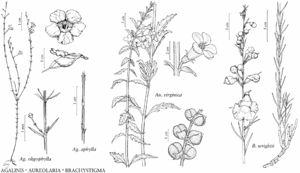Difference between revisions of "Agalinis pulchella"
Bull. Torrey Bot. Club 40: 428. 1913.
FNA>Volume Importer |
imported>Volume Importer |
||
| (One intermediate revision by the same user not shown) | |||
| Line 58: | Line 58: | ||
|publication year=1913 | |publication year=1913 | ||
|special status=Illustrated;Endemic | |special status=Illustrated;Endemic | ||
| − | |source xml=https:// | + | |source xml=https://bitbucket.org/aafc-mbb/fna-data-curation/src/2e0870ddd59836b60bcf96646a41e87ea5a5943a/coarse_grained_fna_xml/V17/V17_979.xml |
|genus=Agalinis | |genus=Agalinis | ||
|species=Agalinis pulchella | |species=Agalinis pulchella | ||
Latest revision as of 19:37, 5 November 2020
Stems branched, 50–120 cm; branches spreading-ascending, quadrangular-ridged, scabrous. Leaves spreading-ascending; blade filiform, 16–40 x 0.4–1 mm, margins entire, midvein harshly scabrous, adaxial surface scabrous; axillary fascicles: length 1/2–1 times subtending leaves. Inflorescences racemiform-paniculiform, flowers 1 per node, some flowers pseudoterminal; bracts shorter than pedicels. Pedicels spreading-ascending, 12–50 mm, scabrous. Flowers: calyx hemispheric, tube 3–4(–5) mm, glaucous, lobes erect, subulate, 0.1–0.6 mm; corolla dark pink to rose, with 2 yellow lines and purple spots in abaxial throat, 22–33 mm, throat sparsely pilose externally and glabrous within across bases of adaxial lobes, sparsely villous at sinus, lobes: abaxial reflexed-spreading, adaxial spreading, 6–12 mm, equal, glabrous externally; proximal anthers parallel to filaments, distal perpendicular to filaments, pollen sacs 2.5–3.8 mm; style strongly exserted, 9–18 mm. Capsules globular, 4–6 mm. Seeds black, 0.5–0.8 mm. 2n = 26.
Phenology: Flowering Sep–early Oct.
Habitat: Dry, open pine savannas, open pine-oak sandhills, dry upslope areas of wiregrass-dominated mesic prairies, chalky glades or roadsides, dry sandy or clay roadsides beside existing or remnant savannas.
Elevation: 0–100 m.
Distribution
Ala., Fla., Ga., La., Miss., Tex.
Discussion
Agalinis pulchella is an uncommon species in the easternmost area of its range and is common only westward in southeastern Texas.
Selected References
None.
